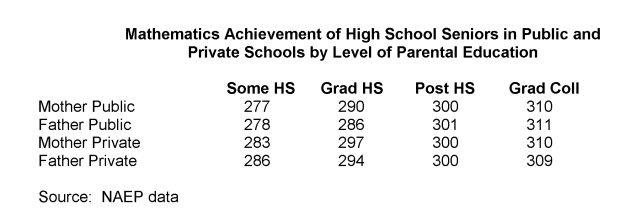We've had a blizzard of articles recently comparing Catholic and public schools. Stories in Forbes magazine, the New York Times and Readers Digest -- to name only three of them -- assure us that Catholic schools do a much better job of educating students than public schools. These articles are not scientific. A usual technique is to contrast "typical" Catholic and public high schools, find some particularly moving story of poor parents and students who have fled public schools and quote a few favorable remarks.
The bias of articles like these might not make much difference if there wasn't a lot at stake. But the supposed superiority of Catholic schools has become the main selling point for private school choice proposals being considered by the U.S. Congress and many state legislatures. You'd think that major periodicals would want to give policy makers and readers some intelligent basis for deciding this issue. Instead, they're simply knocking public schools and praising Catholic schools.
What are some of the questions they should ask? The first is whether Catholic schools are educating the same kids as public schools. When Lester Maddox, the former governor of Georgia, was told that his number one priority should be improving the prisons, he replied that the only way to do that was to attract a better class of prisoner. Is that what the Catholic schools are doing? Most of the articles praising Catholic schools take it for granted that they are more successful with exactly the same kids, but there's lots of evidence that Catholic schools just have a "better class of prisoner." For example, Catholic schools select students and can expel them if necessary; most parents pay to send their kids to Catholic schools and are required to be involved in school activities. Don't these differences suggest that students in Catholic schools are also different?
The second question the press should be asking is whether or not there are differences in public and private school performance when the students are similar. For example, data from the National Assessment of Educational Progress show that the children of high school dropouts achieved at approximately the same level whether they were in public or private school, and the same was true for the children of college graduates. Instead of depending on heart-warming anecdotes, why don't articles about the supposed superiority of Catholic schools look at data like this and analyze it?

People who support giving public money to Catholic schools say this will help not only Catholic schools but public schools as well because it will promote healthy competition. So the third question is "What makes us think that competition between public and private schools is the best way to raise the standards of achievement in our schools?" We know that markets are excellent for many things, but we don't have any proof that they will work for schools. We've conducted no large-scale experiments using market schools. None of our industrial competitors, whose schools do so much better than ours, uses competition between public and private schools as a way of attaining excellence. And they all have mainly public schools. Why should we take a big risk like this without any basis for thinking it will be successful? And why are the magazines and newspapers that should be leading us to be thoughtful -- and skeptical -- failing to ask any of the hard questions?
Finally, even if we were to put all our students into Catholic schools, and even if all our students scored the way Catholic students do now, where would we be? Miles behind our competitors and almost where we are now in terms of achievement. Germany and France, two of our leading competitor nations, have 30 or 40 or 50 percent of students at or above the top level that 4 or 5 percent of our students reach. It is true that 54 percent of seniors from Catholic schools are able to do seventh grade math in comparison with 47 percent of public school seniors. But supposed 54 percent of all our graduating seniors were able to achieve at a seventh-grade level. Is it worth turning our schools upside down to achieve this?
American public and parochial schools are like two race horses who come in neck and neck. But which of them is first doesn't make any difference because they're competing against racing cars that crossed the finish line half an hour before they did.
If we are to bring our education system up to world standards, we need to create schools that are better than and different from any public or private schools we now have. Saying anything else is blatant propaganda, and people who are trying to make up their minds about an issue as important as our education system deserve more than that.
